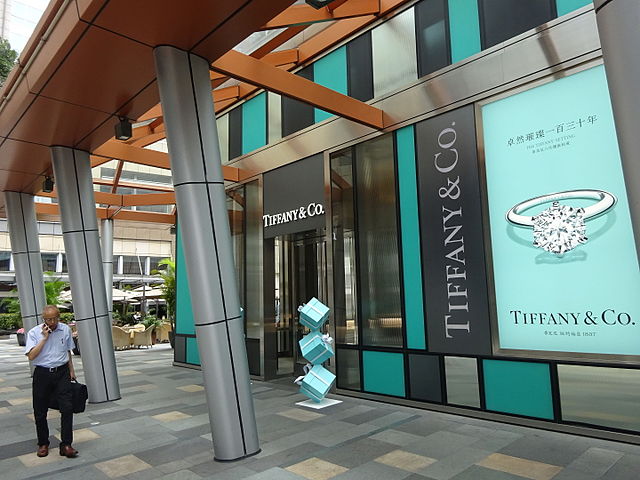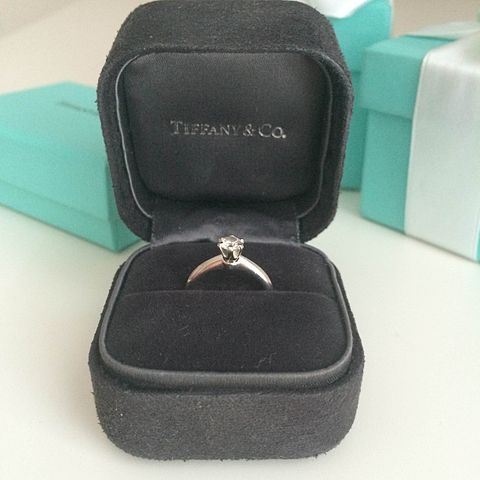
By Melissa Sarnicke, Staff Writer
As the world’s premier jeweler since 1837, Tiffany & Co. is known for its sophisticated and timeless jewelry and exceptional craftsmanship, particularly for its diamond engagement rings.[1] Tiffany’s dazzling diamonds radiate elegance, adorning celebrities in movies, magazines, and on the red carpet.[2]
In 2012, however, the luxury jewelry retailer discovered that Costco Corporation was selling counterfeit engagement rings under Tiffany’s registered trademark name, “Tiffany,” in its warehouse stores. Costco’s willful infringement on Tiffany’s registered mark sparked a huge lawsuit between Tiffany and Costco, and Tiffany was finally compensated just last month.
Back in November 2012, Tiffany was alerted by a customer who spotted engagement rings advertised as “Tiffany” rings at a Costco warehouse store located in Huntington Beach, California.[3] After conducting an investigation of the store, Tiffany discovered that Costco was selling engagement rings in a showcase next to labels describing them as, “6399 – Platinum Tiffany .70 VS2, 1 Round Diamond Ring – $3,199.99” and “605880 – Platinum Tiffany VS2.1 1.00CT Round Brilliant Solitaire Ring – $6,399.00.”
Unbeknownst to Costco customers, these rings were neither manufactured nor licensed by Tiffany. From 2007 to 2012, Costco sold anywhere between 2,500 and 11,000 of these counterfeit engagement rings under the name, “Tiffany” to consumers in its stores.[5] According to The Fashion Law, “hundreds — if not thousands — of Costco members bought engagement rings under the false impression that they were authentic Tiffany products.”[6]

Despite Tiffany’s efforts demanding that Costco remove the labels bearing the “Tiffany” trademark, Tiffany filed a complaint against Costco in the United States District Court for the Southern District of New York in February 2013.[7] A month later, Costco filed its answer and counterclaim, asserting that the “Tiffany” name was generic. Although Tiffany moved for summary judgment, the court determined that genuine factual disputes existed as to the meaning of the names “Tiffany” and “Tiffany setting” in the minds of consumers.[8]
Last year, District Judge Laura Taylor Swain ruled in favor of Tiffany, finding that it had offered credible evidence establishing that it owned a valid registered trademark for the word “Tiffany” and that Costco’s use of the “Tiffany” mark was likely to cause consumer confusion.[9] The court noted that “Tiffany owns ‘97 separate trademarks’ relating to the Tiffany company name,” and mark Registration No. 1,228,409 for the term “Tiffany” was the most relevant to this case.[10]
Though Costco argued that the name “Tiffany” had “become a generic term for a certain style of a pronged ring setting,”[11] the judge shot down Costco’s claim; the court held that Tiffany’s registration of the “Tiffany” mark was prima facie evidence that the mark was valid.[12]
To determine whether there was a likelihood of confusion among consumers as to the source of the name “Tiffany” on Costco’s labels, the court analyzed seven factors, including: the strength of the “Tiffany” mark; the degree of similarity between Plaintiff’s and Defendant’s marks; the proximity of the products in the marketplace; evidence of actual confusion; Defendant’s good faith in adopting its mark; the quality of Defendant’s product; and the sophistication of the consumers.[13] Each of the factors weighed heavily in favor of Tiffany, and the court ultimately found Costco liable for infringing on Tiffany’s trademark by selling diamond rings under the “Tiffany” name and for causing consumer confusion.[14]
On Sept. 20, 2016, the damages trial proceeded to determine Costco’s monetary liability for selling counterfeit “Tiffany” engagement rings.[15] According to The Fashion Law, “Costco attorney James Dabney . . . told the court that Costco has determined that it sold about 2,500 units of the infringing rings[, and] he asserted the retailer’s infringement relate[d] to a problem [of] managing certain display case signs, which ha[d] since been corrected.”[16]
Additionally, Costco maintained that the sale of these 2,500 rings amounted to a maximum of $781,000.[17] Tiffany attorney Jeffery Mitchell, however, claimed that Costco’s records were inaccurate and highlighted that as many as 11,000 rings could have been sold under the “Tiffany” name.[18] Mitchell said that Costco’s gross profits for the rings ranged from $1.8 million to $6.3 million.[19]
The jury finally determined that Costco owed $5.5 million in compensatory damages to Tiffany for selling the counterfeit engagement rings under Tiffany’s registered trademark.[20] Business Insider indicated that the “$5.5 million represents the amount of profit Costco made from the sale of the rings that would fairly compensate Tiffany.”[21]
Furthermore, Tiffany is entitled to punitive damages, and that amount was determined on Oct. 5. As reported by the New York Post, the jury “walloped the discounter” by ordering it to pay an additional $8.25 million in punitive damages, making the total award to Tiffany $13.75 million.[22] Costco failed to comment on the amount of the award, but did indicate that it will possibly appeal the decision, stating, “[T]he jury’s verdicts will be subject to further consideration by the Court.”[23]
As for Tiffany, its senior vice president and general counsel, Leigh M. Harlan, emphasized, “We felt a responsibility to protect the value of our customers’ purchases and to ensure that Costco’s customers were not [misled] about their purchases. It is critically important that the Tiffany name not be used to sell any engagement ring that is not its own.”[24]
Ultimately, Tiffany’s rigorous policing of its trademarks has ensured that infringers, like Costco, will not get away with using the “Tiffany” name to sell knock-off diamond engagement rings.
Sources
[1] The Tiffany Story, Tiffany & Co., http://www.tiffany.com/WorldOfTiffany/TiffanyStory/Default.aspx.
[2] The World of Tiffany A Celebrated Following, Tiffany & Co., http://www.tiffany.com/WorldOfTiffany/TiffanyStory/Legacy/Following.aspx.
[3] Tiffany & Co. v. Costco Wholesale Corp., 127 F. Supp. 3d 241, 245 (S.D.N.Y. 2015).
[4] Id.
[5] Tiffany & Costco Face Off in Court Over Counterfeit Ring Damages, The Fashion Law (Sept. 30, 2016), http://www.thefashionlaw.com/home/tiffany-and-costco-face-off-in-court-over-counterfeit-ring-damages.
[6] Id.
[7] Costco Wholesale Corp., 127 F. Supp. 3d at 245.
[8] Id. at 246.
[9] Id. at 254.
[10] Id. at 247.
[11] Id.
[12] The Fashion Law, supra note 5.
[13] Id. at 247.
[14] The Fashion Law, supra note 5.
[15] Andrew Chung, Federal Jury: Costco Should Pay $5.5 Million for Selling Fake Tiffany Rings, Business Insider (Sept. 30, 2016, 11:57 AM), http://www.businessinsider.com/jury-rules-costco-should-pay-5-million-for-selling-fake-tiffany-rings-2016-9.
[16] The Fashion Law, supra note 5.
[17] Chung, supra note 15.
[18] The Fashion Law, supra note 5.
[19] Id.
[20] Chung, supra note 15.
[21] Id.
[22] Lisa Fickenscher, Costco Has to Pay Even More Now for Selling Fake Tiffany Rings, New York Post (Oct. 5, 2016 3:04 PM), http://nypost.com/2016/10/05/costco-has-to-pay-even-more-now-for-selling-fake-tiffany-rings/.
[23] Id.
[24] Id.